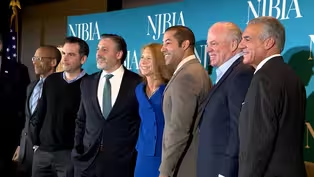NJ Spotlight News
NJ Spotlight News: December 4, 2024
12/4/2024 | 26m 46sVideo has Closed Captions
Watch as the NJ Spotlight News team breaks down today’s top stories.
We bring you what’s relevant and important in New Jersey news and our insight. Watch as the NJ Spotlight News team breaks down today’s top stories.
Problems playing video? | Closed Captioning Feedback
Problems playing video? | Closed Captioning Feedback
NJ Spotlight News is a local public television program presented by THIRTEEN PBS
NJ Spotlight News
NJ Spotlight News: December 4, 2024
12/4/2024 | 26m 46sVideo has Closed Captions
We bring you what’s relevant and important in New Jersey news and our insight. Watch as the NJ Spotlight News team breaks down today’s top stories.
Problems playing video? | Closed Captioning Feedback
How to Watch NJ Spotlight News
NJ Spotlight News is available to stream on pbs.org and the free PBS App, available on iPhone, Apple TV, Android TV, Android smartphones, Amazon Fire TV, Amazon Fire Tablet, Roku, Samsung Smart TV, and Vizio.
Providing Support for PBS.org
Learn Moreabout PBS online sponsorship♪ ANNOUNCER: Funding for NJ Spotlight News is provided in part by -- NJM Insurance Group.
serving the insurance needs of residents and businesses for more than 100 years.
New Jersey Realtors.
The voice of real estate in New Jersey.
More information is online at njrealtor.com.
And by the PSEG foundation.
♪ >> Tonight on NJ Spotlight News, a call to restrict cell phone usage in schools across the country, as mental health concerns for children continue to grow.
Plus, gubernatorial hopefuls gathered to pitch their economic times to the business leaders of the state.
Also, a growing push by doctors and politicians for expanding access to groundbreaking weight loss drugs.
>> I would make sort of an ethical argument that, you know, we would be gatekeeping a really good, life-saving drugs for a lot of these people by not making that available.
>> And a season of change in D.C., one of New Jersey Republican finds a new favor with the incoming president.
Cory Booker gets a promotion.
George Helmy moves in.
>>.
>> He has been in the house on the side of the town as we say in D.C., for three terms.
I am really curious to see what happens in this next chapter for him, what sort of senator does he become?
>> NJ Spotlight News begins right now.
♪ ANNOUNCER: From NJPBS Studios, this is "NJ Spotlight News" with Briana Vannozzi.
♪ >> Good evening and thanks for joining us.
I am Raven Santana, in for Briana Vannozzi.
We begin with a few of today's top headlines.
First, a nationwide sales of student crackdown, as some New Jersey districts start to restrict cell phone use for students.
The U.S. Department of Education is now calling on all states, districts and schools around the country to implement policies to restrict cell phone access to students while at school.
The department noted the negative impact cell phone use and social media access can have a students' mental health.
Alongside this announcement, a playbook was released to give schools guidance on creating those policies, and if they make recommendations for full-day restrictions as well as designing policies alongside students and parents.
The playbook tells policymakers to carefully consider exceptions to the rule, will emergencies or health emergencies.
And they note districts should review rules for storing photos, making clear who is in charge of enforcing social policies and making staff get adequate training.
In New Jersey, a number of districts already have cell phone policies in place.
As the conflict in Gaza rages on over a year later, Teaneck high-school student joined by members of both Jewish and Palestinian community leaders, staged a second walk out in solidarity with Palestine today.
The walkout, which took place this afternoon, was intended to spread awareness about the ongoing alleged displacement and genocide the Palestinians since the 1948 Arab Israeli war, but also, to seek protection for free speech and advocate for a hands-off student policy.
The Teaneck superintendent sent out a letter to parents before the walkout, stating there is no evidence suggesting this protest was initiated, organized or encouraged by Teaneck high school scholars.
But we spoke to students on the ground, who set the walkout and the march was, in fact, student -led.
Last year the U.S. Department of education opened an investigation into Teaneck schools, supported by gubernatorial candidate Josh Gottheimer.
The search for the next record university president kicked off this week, with three town halls, one on each campus for members of the Rutgers community, to tell the search community what they want to see in their next leader.
To date town Hall was in New Brunswick, where a handful of speakers took the opportunity to express their desires to the community, including hopes that the next president will lead the University with an ionic consensus building, will focus on building the school's reputation, and will not be afraid to mix it up with state leaders in Trenton.
Today the community was in Newark.
Camden's town hall is set for tomorrow.
The records president announced in September he would step down in June.
The search committee working with a consulting firm, will take public feedback to make a candidate profile in the spring.
People who would like to give feedback but cannot attend a town hall, can reach out to the committee through that Rutgers presidential search website.
Some of the top candidates in next year's race for governor got to share the spotlight to day five candidates sat down for a panel at the NJBIA annual policy forum, including Jack Ciattarelli and Bill Stadia, in their first public face of this cycle.
As a senior correspondent David Cruise reports, it candidate got a chance to share their vision for the future of New Jersey's economy.
>> short answer is yes.
>> short answer is yes.
Reporter: There was a lot of agreement at the New Jersey Business and Industry Association policy forum today, five candidates, three Dems and two Republicans, tech business and industry-related questions from NJBIA Trusty Rick Singleton.
But it's a lively debate and sharp policy differences are what you came here for, there was not a lot of that.
Instead, the candidates focused on practicing their branding.
The business guy -- >> I gave my word as your next governor, I will be the most pro-business governor the state has seen, the entire cabinet will be pro-business.
Our state agencies will work in partnership with you.
Reporter: The innovation guide.
>> the best example of what I would change is what I have done in Jersey City.
We have transformed that city to literally be the economic backbone of New Jersey.
It was a different place when I took office.
Reporter: The blame it all on illegal immigration guy.
>> take a look at just the immigration problem.
You are looking at a $7 billion cost a year to New Jersey because we have nearly 900 thousand illegals in our state.
You are paying for that.
Reporter: The happy warrior.
>> We weren't afraid to take on the tough issues.
In fact sometimes the state police had to escort me through the walls of Trenton because I was willing to take on the site, because it was worth fighting for.
The people of New Jersey are absolutely worth fighting for.
Reporter: the affordability guy.
>> any time we say we will help that group for this group or change the structure that impacts world are another, you're missing the point.
New Jersey is a good place to live and do business, but hard to afford.
A hard place to make sure your bottom line works.
Reporter: NJBIA CEO Michelle says the other candidates in the race, Congress members Mikie Sherrill and Josh Gottheimer, Newark Mayor at Ras Baraka and Republicans state Senator John Bramnick and former state senator Ed Durr, had scheduling conflicts and couldn't make it.
The marquee attraction was supposed to be Jack Ciattarelli versus Bill Spadea , the presumed frontrunners making their first appearance together.
But since they were reportedly admonished to play nice and not engage one another directly, this was their only direct communication.
>> Not all kids want or need to go to college.
My son is a great licensed diesel mechanic.
>> I am thrilled that after my advocating for this for 10 years, that, Jack, you agree with me that it is time to remove the stigma of people that don't want to go to college.
Reporter: But as the moderator reminded the candidates -- >> Today is a forum, not a debate.
Reporter: The audience had a few on-topic questions that the candidates handled, and nobody got hurt.
In that respect, it was a little like a Royal rumble gentlemen, please.
Stay at the stage for a minute.
As you are shaking hands, shake hands for a minute.
We want to take a picture.
Reporter: Except nobody got thrown over the top rope.
There will be plenty of that for in the next six.
>> Months.
Sitting Senator George Helmy is announcing he will step down from the role he took, after embattled former Senator Bob Menendez left the position.
His resignation paves the way for Senator elect Andy Kim to be sworn in next week.
But there is a lot going on, in Washington and New Jersey lawmakers are in the thick of it.
For more from the hill I am joined by our Washington correspondent.
Thanks for joining me, Ben.
A lot of moving and shaking in Washington.
Let's start with George Helmy resigning after a short stint -- he replaced Bob Menendez.
Do you spend time with him.
What was his biggest contribution or project while in the seat?
Guest: Biggest contribution, it is sort of a boring thing, but voting for judges to fill out the federal bench.
Easley's contribution.
He also served a functional role that is mundane but important, overseeing the Senate.
When you are in the majority, you need someone to oversee the balls and strikes of the Senate, to use a baseball term, and manage the flow.
That's his two obvious accomplishments.
Raven: He was really a caretaker for the Senate.
Guest:, essentially yes.
And Andy Kim will be sworn in Monday.
He will make the transition from the house to the Senate.
He has been in the house on the side of the dorm, as we say in D.C., for three terms.
I am curious what happens in the next chapter for him, what sort of senator does he become?
Easier and more of a legislative leader?
What policy positions does he stake out?
How does he work with Senator Cory Booker and how they complement each other.
I am curious.
Raven: Yeah, speaking of Booker, big changes in Senator Democratic leadership, a promotion of sorts for Booker.
Tell me about that.
Guest: So, in the new Senate, in the new year, he will be the fourth ranking Democrat within their party conference.
So, that is a role that comes with more responsibility for the National Party.
He will be more of a national messenger and help contribute to the Democratic-party strategy nationwide, not just within New Jersey.
Raven: Then let's turn to Congressman Jeff Van Drew, big Donald Trump supporter.
He said he turned down multiple positions with the incoming Trump Administration.
What are you hearing?
Guest: Right, I snagged him a few weeks ago after the election at votes.
I had asked him, what sort of role are you going to fail as perhaps a go-between with New Jersey and the incoming Trump Administration?
And he told me in a previous interview that he is close to the president, talks once a week with the President-elect, and he will sort of be this Consiglieri, messenger between.
The state certainly within Republican politics, and the 47th president.
He didn't tell me what positions he turned it down.
But, Of course, that would really complicate the house math.
In the new Congress, Republicans at this point, will have 200 17 seats versus Democrats at 215.
There was a seat just called in California today for Democrats.
So they will have essentially zero breathing room, Republicans, to pass really anything.
It could get bumpy and really hotly contested right away.
Raven: Well, as Congress returns to wrap up its session before the end of the year are what bills need to be passed in the next month before Trumpers inaugurated?
Guest: Really there are two bills.
We have to fund the government.
I don't have a vote, as much as I might want to vote, I have zero votes.
They have to pass a funding bill to keep the government running through December 20.
And there is another key bill that has no money, but it sets the funding priorities for the military, it is called the NDAA.
Basically it authorizes the military for another year and sets all sorts of programs and targets, objectives the Pentagon.
Raven: All right, thanks for joining me.
Guest: Happy to talk.
Raven: Weight loss drugs have surged in popularity in the last few years.
Mounjaro, Ozempic and Wegovy are sought after, but, at a cost for some.
The Biden administration announced last week plans to require Medicare and Medicaid to offer coverage for these medications for people seeking obesity treatment.
This could provide an answer to many struggling to shed a few pounds.
Over Senior correspondent Brenda Flanagan reports, there are new efforts in the state to cover these weight loss drugs.
Reporter: Jana is a professional dog walker, so she gets lots of exercise escorting clients around Hasbrouck Heights.
But she couldn't lose weight.
Meanwhile, her blood pressure and the risk of stroke caps on rising, so her doctor prescribed the popular weight loss drug Wegovy.
>> I really just want to feel better and more and confident.
I don't like that with a look.
A look at old pictures while, what happened, you know?
So I just want to get back on track.
Reporter: Wegovy and similar injectable weight loss drugs called GLP-1's can cost more than a thousand dollars a month.
Despite that they are often backordered.
Jenna can afford it only because she is covered by her parents' insurance.
>> I get lucky.
He had to pay out of pocket, I definitely wouldn't have.
Reporter: In New Jersey, almost 20% of the population struggles with chronic obesity but New Jersey is not one of the 13 or so states where folks and Medicaid can get GLP-1 medications for weight control.
>> Right now Medicare and Medicaid, I believe, to cover GLP-1 drugs if someone is diabetic or if they have heart disease.
It's not covered simply for people who want to lose weight, so it is an important distinction.
>> I would make an ethical argument that we would be gatekeeping for good, life-saving drug by not making that available.
Reporter: This doctor runs a weight loss clinic in Rikers and he supports the Biden administration's recent call for Medicare and Medicaid to cover GLP-1's for weight loss, and disagrees with the term Health and Human Services nominee, RFK, Jr.'s association of the three organic meals a day can solve the nation's obesity crisis.
>> people on Medicaid often times are on low income and they don't have access to healthy foods.
They can't just drive into Whole Foods and buy organic food for their families, they are often working two or three jobs and have to get frozen meals which aren't healthy, so a lot of their basic just diet and exercise, is easier said than done.
>> I have always struggled with weight, from being on Midnights the first seven years of my career, you just lose your metabolism.
I am on these drugs.
I have lost 80 pounds.
Reporter: Kevin Lyons is a believer.
He is on Mounjaro and says its maker, Eli Lilly, sent representatives to love him as a director of the Police Benevolence Association.
He predicts his 36,000 members will gravitate to the new weight loss drugs, even though New Jersey's health benefits program for local and county workers will get slammed by a 16% premium hike next year.
Liles says eliminating coverage is not worth the savings.
>> It was one .6% on the overall rate, that's his medical and prescription, that it would save if we eliminated GLP-1's for weight loss.
To me, that was not worth the squeeze when you talk about it.
Even with a 16% rate increase.
Reporter: A recent study reports drugs spent on weight loss drugs increased 150%.
We go of, Ozempic, Mounjaro and Trulicity it ranked in the top 10 in the state benefits plans last year.
In response to double-digit premium hikes, some municipalities like Newark are opting for alternative health plans.
Policy experts point to other factors -- >> It's not just the cost of weight loss drugs, if the cost of specialty medicine.
As an example, maris is considered a specialty drugs and will cost approximately 7000 dollars a month for that drug.
Reporter: A bill would require New Jersey State health plans and Medicaid to cover GLP-1 for patients who have obesity-related health problems that have not been mitigated by diet and exercise alone.
Jenna agrees.
>> I don't think it should be over the counter, but it should be easier for people to get their hands on it and not expensive.
Reporter: She just started treatment a month ago and hopes to see results soon.
In Hasbrouck Heights, Brenda Flanagan, NJ Spotlight News.
Raven: The U.S. Supreme Court heard oral arguments today over a Tennessee law that bans gender-affirming care for transgender youth.
The 2023 law prohibits doctors from prescribing puberty-blockers and hormone therapy for transgender teens, even though they are permitted for minors to take for other health reasons.
Three Tennessee teenagers and their parents sued the state, saying of the law is unconstitutional and they are article treatments for children with gender dysphoria.
The court could either uphold or erase similar bans in about two dozen states.
Meanwhile, New Jersey has taken steps to protect access to such care.
In November, Attorney General Mike Polat Can joined with other state attorneys, filing a brief arguing that gender-affirming care for transgender youth can be life-saving and is endorsed by every major medical Association.
Last year Governor Murphy also declared New Jersey a safe haven for transgender and binary people seeking gender-affirming care.
This year, community advocates celebrated the passage of a bill that published to fund community crisis pilot programs in six counties.
But almost a year later, that adulation has turned to frustration, advocates say the state has dragged its feet in releasing funds, and delayed forming a Special Counsel which would help guide police responses to people in a mental health crisis.
Senior correspondent Joanna Gagis spoke to community groups who fear innocent lives will be lost if the state continues to delay the launch of these programs.
>> We got a bill signed in January.
Christmas will be here in two weeks and nothing has gotten done.
Reporter: Community members who uploaded the signing of the crisis response act in January are now putting their hands in the air wondering why there has been so little progress on it since then.
>> If they had followed their own guidelines, we should be close to implementation in a very real way.
Reporter: Implementation of a law that appropriates $12 million settlement community response teams in six counties as a pilot program, allowing existing community-based organizations to launch crisis response teams.
>> It's not rocket science.
The communities have been identified, the grantees have been identified.
The process of putting together an advisory board to oversee best practices and some real standards, that's not rocket science.
Reporter: And yet, no funds have been rewarded.
The law was named after Andrew Washington, who was killed by police on August 27, 2023, after his family called the hospital for help during a bipolar episode.
Instead, police arrived in Washington was shot and killed.
His bond thought the state would have done more since January in her nephew's name.
>> I thought the funding would go towards programs and people that would be more supportive to the mental health community.
But on the ground level, where if someone is having an episode or a family member is experiencing it, they have someone to talk to, some that can actually come out and talk to their loved one.
Reporter: That while state leaders stagnate on taking action, including appropriating the science, community leaders say lives are at stake, lives like Victoria Lee, a young woman who was shot and killed while having a mental health crisis in Fort Lee.
>> Based on all we know and all that we have in hand, somebody could still be alive.
>> It was hard to speak into the family, especially the brother who called for help.
If you think you're helping your family member.
[voice breaks] And the person gets killed.
And that shouldn't happen.
>> The evidence is there.
The more support that these programs get, they have had a direct response in the reduction in violence in communities, and also hostile encounters between members of the community and law enforcement.
So we really want to support these programs.
Reporter: The law also calls for the creation of a community advisory Council to advise and oversee law enforcement's response to mental health crisis calls.
So far, only five of 13 appointments have been made, the legislature still needs to appoint 8 more.
We reached out to Senator next to Terry for an update but have not yet heard back.
Meanwhile, the state is leaning on a program that pairs law enforcement with mental health professionals, that these advocates want what was promised in the law, a response that does not include police.
>> Community-led models grew out of work that is indigenous to the communities themselves.
One of the things law enforcement has a real hard time accepting is that, because of the racial violence of law enforcement and people of color, they don't realize that even in unintended ways, they can be triggering for somebody in a crisis.
>> Because that is led by the community, what you are not having is number one, a one-and-done situation.
That means people responding to these situations live within the community.
They are not seeing them on their worst day and then never again, they are uniquely invested in the holistic health of members of the community.
Reporter: But for now are those response teams are still not in place, and family members remain anxious for their next call for help could be their last.
In Newark, Joanna Gagis, NJ Spotlight News.
Raven: That does that for us tonight, but make sure you check out our latest episode of Hazard NJ.
This season we are reporting on PFAS, also known as "Forever Chemicals," and their toxic impact on our state.
Episode three looks at why the use of these chemicals for so many decades, that they are now in all of our blood.
But what does that mean for our health?
Our team of Rutgers University researchers is trying to help answer that question by studying the blood of residents in Paulsboro,, New Jersey where a high profile pollution incident left the water supply contaminated for years.
You can download episode three wherever you listen.
I am Raven Santana for the , entire team at "NJ Spotlight News," thanks for being with us.
Have a great night.
We'll see you right back here tomorrow.
♪ ANNOUNCER: New Jersey Education Association, making public schools great for every child.
And, RWJ Barnabas health.
Let's be healthy together.
And Orsted, committed to delivering clean, reliable , American-made energy.
>> I am Gloria Monks, 2024 president of New Jersey Realtors.
Whether it is guiding first-time homebuyers through the process, or securing space, and New Jersey Realtors have been helping their clients through real estate transactions for more than a century.
No matter what your unique needs are, there is a knowledgeable New Jersey realtor for you.
Learn more at njrealtor.com/find.
♪
Advocates fault lack of action on crisis-response law
Video has Closed Captions
Clip: 12/4/2024 | 4m 46s | Law signed in January was meant to support community crisis response teams (4m 46s)
DOE urges clear cellphone policies for schools
Video has Closed Captions
Clip: 12/4/2024 | 1m 17s | Some NJ districts have already restricted cellphone use (1m 17s)
Gubernatorial candidates gather at NJBIA policy forum
Video has Closed Captions
Clip: 12/4/2024 | 3m 54s | Candidates discussed their objectives for NJ's businesses (3m 54s)
Health plans consider cost of pricey obesity drugs
Video has Closed Captions
Clip: 12/4/2024 | 5m 2s | Almost a third of NJ's population struggles with chronic obesity (5m 2s)
NJ congressional lawmakers making big moves in Washington
Video has Closed Captions
Clip: 12/4/2024 | 4m 37s | Interview: Benjamin J. Hulac, NJ Spotlight News’ correspondent in Washington (4m 37s)
Providing Support for PBS.org
Learn Moreabout PBS online sponsorshipSupport for PBS provided by:
NJ Spotlight News is a local public television program presented by THIRTEEN PBS
















